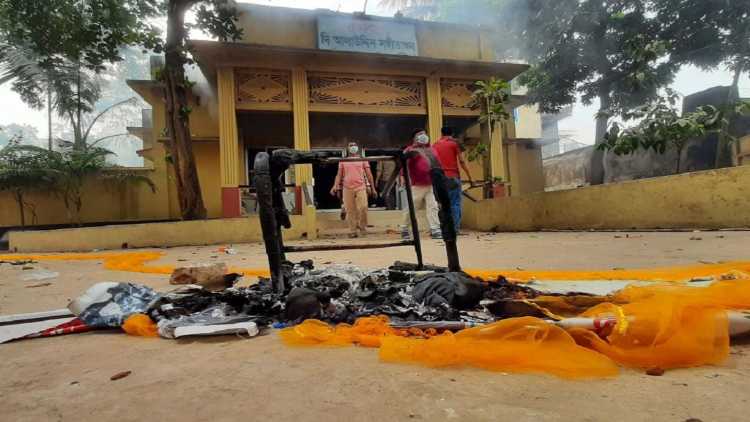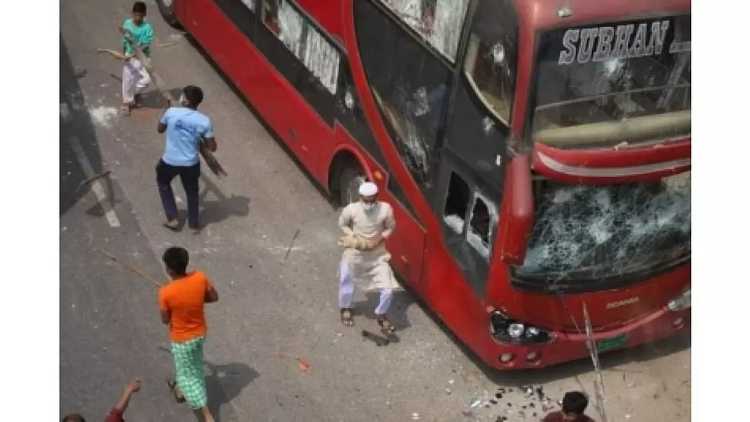
Aasha Khosa
For all the progress and phenomenal economic growth it has achieved in 50 years, Bangladesh faces the prospectus of slipping into violence and chaos if the Islamic radicals under the aegis of Hefazat-e-islami (HeI) that are indulging in violence and calling for bandh are not reined in immediately.
The group that was believed to have been tamed by the Sheikh Hasina government by confining it to running a network of madrasas across the country and looking after issues related to religion, has bared it fangs under the pretext of opposing Indian Prime Minister Narendra Modi’s visit to the country. Modi attended the celebrations of the 50th year of independence of Bangladesh and the centernary celebrations of Bangabandhu Mujur Rehman.
During and after Modi’s visit, the HeI called for hartals, vandalized Hindu villages and properties and killed at least four persons in the violencee. Since the protests didn’t ebb even after the Indian leader had left for home, it’s clear that the HeI was using the occasion to rise as a Islamic force that commands the streets.

Hefazat member burning music academy of Musician Alaudin Khan
Many Bangladeshi analysts are blaming the ruling Awami League for patronizing the Hefazat-e-Islam by allowing it to expand its base and recognizing the degree its madrasa offers to students as equivalent to masters degree; offering prime land to it and changing school syllabus on its demands.
So far, the Hefazat had never challenged Sheikh Hasina and she too listened to them though she didn’t always act on its advice.
During this period, the Islamists carried out murders of secular bloogers and issued threats to others and yet the government failed to provide security to them. Many of them has to take political asylum in Europe.
This was reminiscent of the forced exile of renowned Bangladeshi Writer Taslima Nasreen, who was granted Asylum in Europe and now lives in India after being banished from Bangladesh on diktats of ulemas and radicals.
However, to be fair to the Bangladesh’s PM, she had to counter monsters like Al Qaeda and Jamat-e-Islami (JeI) that were working towards making Bangladesh an Islamic state like Pakistan, seeking to impose Shariah and waging a war against non-Muslims.
In the process it supported the seemingly benign and wannabe group like the HeI. of late the Sheikh Hasina government has kept its concern over the threat issued by the Hefazat against the proposed statue of Bangabandu Mujibur Rehman in Dhaka’s Dholaipar Square under wraps. The outfit has termed intallation of the statue as un-Islamic and harmful. Earlier the group has vandalized the statue of Bangabandu in Khustia.
As after the recent violence has ceased to end with the Heafazat calling for a nation-wide bandh on Friday, some ministers in the Hasina government have called for invoking criminal cases against Hefajat activists for indulging in violence at Shapla Chattor. The government has since acted and booked cases against 14,000 people.

Hefazat activists on rampage
Ever since violence erupted in Bangladesh, the author of Lajja Taslima Nasrin has been regularly speaking up on Twitte against the government for allowing Hefazat to become a monstor. In one of the posts she wrote:
In '94, fathers of these jihadists issued fatwas against me, a humanist writer & committed violence on streets, demanding for my execution by hanging. Instead of taking action against them, govt took action against me. If they were punished then, their sons would not be jihadists today.
In '94,fathers of these jihadists issued fatwas against me, a humanist writer &committed violence on streets,demanding for my execution by hanging.Instead of taking action against them,govt took action against me.If they were punished then,their sons would not be jihadists today. pic.twitter.com/wm73YICt3A
— taslima nasreen (@taslimanasreen) March 30, 2021
Taslima said these Heafazat leaders were progeny of leaders who didn’t want Bangladesh to emerge as a separate country and had collaborated with Pakistani Army in killing people of Bangladesh. “Since they were given amnesty, their children are continuing their mission,” she wrote sharing pictures of violence from her country.
Though Bangladesh is the fifth largest Muslim country in the world, it’s constitution is secular and the country takes pride is its rich Bangla tradition, culture and syncretism.
According to a research paper by Sumriti S Pattanaik of the Manohar Parekh Institute of Defence Stidies and Analyses (IDSA), Delhi, "Hefazat-e-Islami and polics of islamia in Bangladesh' the HeI have been gradually moving towards achieving its motive of establishing an Islamic rule on the streets. Its chief Juniad Babunagori has openly stated that he will work for uprooting anti-Islamic forces and its activists won’t mind shedding blood for the cause of Islam.
Sheikh Hasina had won a similar battle against Jamiat-e-Islami party by making its leaders stand trial for collaborating with Pakistani army in genocide of Bengalis. Its leaders were hanged and party disbanded.
According to the IDSA paper, the Hefazat is trying to occupy the space created by absence of Islamic parties like Jamat-e-Islami and weakening of the opposition BNP. It stated that HeI and another radical group close to the opposition BNP Somomona Islami Dal (similar thinking Islamic Parties), had organised a huge demonstration in Dhaka against the French President Emanuel Macron on the issue of cartoons of the Prophet Mohamed.
The paper says “HeI is gaining larger traction among political parties who are vying for public space. There were reports that even some of JeI leaders were present at the funeral of former Ahmed Shafi. Jamaat was embittered by the HeI’s reluctance to fight against the government, after its cadres were killed in 2013. Though there are theological differences between Jamaat and ulemas, JeI has always benefited from the politics of religion and both the JeI and ulema leaders had entered into co-habitation with each other.
“The takeover of HeI by more radical leaders opposed to the government only reflects the limitation of the latter’s appeasement policy. While the ulemas may not be electorally successful; their street power and ideological commitment to their interpretation of religion will push the government to further Islamise the social sphere. That will pave the way for the ultimate political success of the Islamists.”
